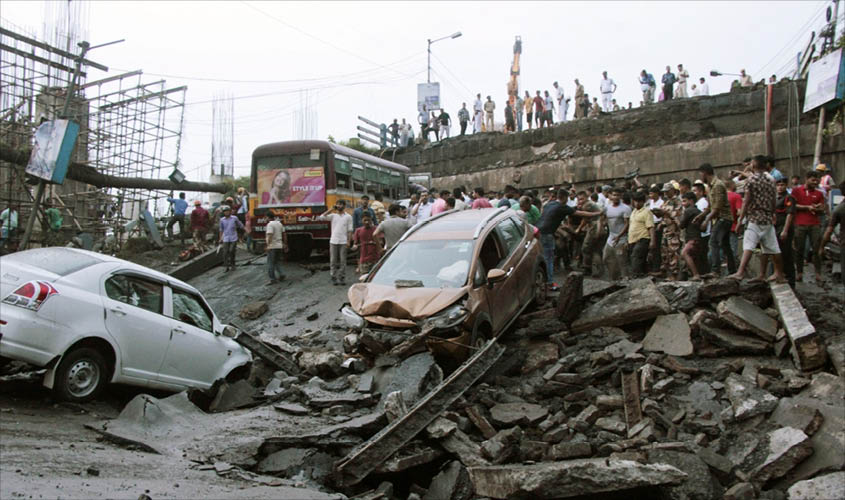Warning bells over poor maintenance of the Majerhat bridge that collapsed earlier this week in Kolkata, leaving three dead and several injured, were sounded way back in 2015, but were not heeded, according to senior officials in the West Bengal government.
Sources in the Bengal government said that Public Works Department (PWD) engineers had warned about the structural distress of the bridge due to its age and load factor caused by increasing traffic and the re-laying of the bridge’s surface every year with bitumen, without taking into cognisance the load on the pillars.
A senior official in the Bengal government told this correspondent: “The bridge was an old one, around 55 years old. However, every year the surface of the bridge was re-laid using bitumen which increased the load factor of the bridge. But no regular study was done to check the structural stability of the bridge or whether it was being able to handle the increasing traffic load. Even the redundant tram lines laid over the bridge were not removed as it would have incurred cost for the government.”
Talking to The Sunday Guardian, Professor Saroj Mandal, expert in civil and structural engineering at Jadavpur University, also corroborated the fact that the increasing load and the year-on-year heavy layers of bitumen used as patch work to repair the surface could have been a cause for it giving way.
“The load on the bridge kept increasing with time. The layers of bitumen have definitely increased its load. Maintenance of the bridge was also not up to the mark. Lots of vegetative growth in and around the bridge also affected its health, leading to the development of cracks. Corrosion of materials with water seeping in could also be a reason for large cracks and weakening health of the bridge.” Professor Mandal said. Such a bridge collapse is not a first in Kolkata; in 2016, an under-construction flyover fell, leaving 26 dead and several injured, after which the West Bengal government called for a safety and “health” audit of all the bridges and flyovers in Kolkata. However, if sources are to be believed, all such audit reports are gathering dust in the rooms of Nabanna, the Bengal government’s secretariat. The Bengal government had engaged the RITES group, an engineering consultancy firm, for auditing some nine bridges and flyovers in Kolkata after the 2016 flyover collapse and, according to sources, the RITES group had flagged severe flaws in at least two bridges in Kolkata—the Bankim Setu that connects Howrah Maidan with Howrah Station and had developed hairline cracks and peel-offs in its structure. It had also pointed out flaws with the concrete of this bridge and had suggested extensive repair works.
The Sealdah flyover was also not in shape, the RITES report had pointed out, and suggested a thorough maintenance of its structure. The exercise to audit some other bridges could not be completed in its entirety due to non-availability of the drawings of these bridges with the Bengal government.
A government official, requesting anonymity, said: “Not much work was initiated by the government for the upkeep of these old bridges apart from minor repair works and painting of the bridges. The team that visited the Vivekananda Flyover had also submitted its report, but it is gathering dust. PWD engineers who carry out the repair works do not know the technicality of bridges and flyover structures; therefore, they do not pay much attention to such structures.”
However, Firhad Hakim, Urban Development Minister in the Mamata Banerjee government, told The Sunday Guardian that the Chief Minister has already constituted a fact-finding committee that would look into the reasons that led to the collapse of the Majerhat Bridge and “all responsibilities would be fixed”. Asked about the action taken with the audit reports of bridges in Kolkata, Hakim said, “We had repaired the structural damages pointed out by the RITES group. Some cracks and gaps between the girders were pointed out and we had done the repair works. I have also asked for conducting a health audit of all flyovers and bridges in Kolkata again. But the problem is that there are no such firms in Kolkata that can do this work; so we will bring companies from other states to do this.” A senior Trinamool Congress leader also called for a safety and health audit of all bridges and flyovers not only in Bengal, but across the country. The senior TMC leader, requesting anonymity, said that all the bridges, both under the Railways and state or Central governments, need to be audited: “The rate at which pre-fabricated materials are being used, it seems like we are in a huge mess. For many of the bridges in India, we do not even have the technical knowhow of their construction and designs. What we are doing is that we are repairing those bridges and adding on more weight and uneven distribution of weights to these bridges. Mere painting of the bridges and doing some patchwork do not qualify as maintenance.”
The Federation of West Bengal Truck Association has asked the Bengal government to conduct a safety and health audit of all its flyovers and bridges across the state.

